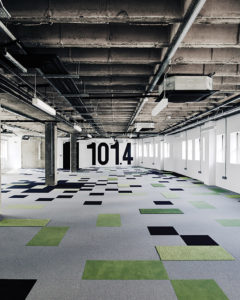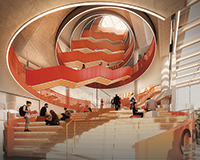
Wales’s digital sector is expanding at a healthy rate and is helping Cardiff diversify its economy beyond the public sector.
According to Tech City’s 2016 Tech Nation report, between 2010 and 2014, digital sector turnover in Cardiff and Swansea increased by 15%, driven by e-commerce, fintech and software development firms.
Ken Poole, head of economic development at Cardiff City Council, says: “When you look at the tech sector in the round, it has become a vital component in the city’s economy and integral to our strategy to make Cardiff less dependent on public sector jobs.”
Cardiff has become a hub for creative industries, which already employ around 6,000 people. Further growth is likely to be stimulated by BBC Wales’s decision to develop a 150,000 sq ft new headquarters at Legal & General and Rightacres’ Central Square scheme in the city centre.
Meanwhile, life sciences continue to prosper and advanced manufacturing has gained momentum through initiatives such as the Compound Semiconductor Centre, a partnership between chip manufacturer IQE and Cardiff University.
Poole says: “We need to create another 40,000 jobs over the next 20 years and accommodating these businesses is a huge challenge.”
Knight Frank partner Mark Sutton says: “Over the past three years Cardiff’s office market has seen 1.6m sq ft of take-up in 360 deals. TMT now accounts for 15% to 20% of the market and we can only see that share increasing.”
The BBC’s commitment to Central Square has already attracted enquiries from creative and tech occupiers. Other recent tech lettings include MotoNovo Finance, S3 Advertising and NatWest’s Entrepreneurial Spark business accelerator hub.
We were inspired by the type of space being offered to creative and tech occupiers in London
Texas-based security software company Alert Logic has also doubled its space at Capital Quarter from 10,000 sq ft to 20,000 sq ft.
The city has also enjoyed success through its network of incubator and co-working space. Alongside specialist space such as the Cardiff Medicentre for biotech and medtech start-ups, business support centres include the Welsh government’s GloWorks hub for creative businesses on Cardiff Bay and Cardiff City Council’s two Cardiff Business Technology Centres.
In 2018, Cardiff University hopes to open its Innovation Centre, providing 30,000 sq ft across 40 to 50 units in which knowledge-based firms can access university support and expertise. Head of innovation systems and engagement Rhys Thomas says: “We are building it because we do not feel there is sufficient infrastructure in Cardiff to support the growth of these types of businesses. We need to demonstrate demand in order for private sector developers to have confidence in the market.”
Gary Carver, head of office agency at Savills, says: “Creative and tech occupiers are growing in number and the market is starting to pay closer attention to the way they want to work.”
For instance, software company Method4 has allocated space in its offices at Imperial House for co-working space Indycube, and in September Tramshed Tech launched a co-working space for digital businesses and professionals in the city’s former tram depot.
Tramshed Tech members can access a large co-working area, meeting rooms and breakout space. There are also 20 business units for permanent tenants on flexible leases. Tenants already signed up include media firms WildFlame Productions and social media analytics company Blurrt.
Elizabeth Arnold, commercial and relationship manager at Tramshed Tech, says: “We are looking to create a platform to allow businesses to grow. They can start as a hot-desker, then move on to a dedicated desk and up to having their own office.”
So there is support for tech businesses in early stages of growth, but where do they go when they are ready to upsize?
With a number of office refurbishment projects under way in central Cardiff, developers are finally beginning to address the requirements of tech occupiers at various stages of growth.
Helical Bar has transformed unused space above its Morgan Quarter retail scheme into studios aimed at tech and creative occupiers. TV company Bad Wolf Productions and crowdfunding platform Crowdcube are among firms which have signed up for units ranging from 150 sq ft to 2,000 sq ft. Knight Frank says it has signed 19 occupiers since June on flexible leases, totalling around 8,000 sq ft.
Helical Bar investment director Duncan Walker says: “We have had a lot of success attracting tech occupiers to our Shoreditch portfolio and saw the opportunity to fill a gap in the market in Cardiff. Tenant demand is definitely there and if you provide the right type of space for these occupiers you will fill it.”

Another Cardiff building getting the so-called “defurb” treatment is 101 St Mary Street. In June, 101 Asset Management completed the Shoreditch-style refurbishment of two 6,500 sq ft floors. Asset manager Anthony Phillips says: “We were inspired by the type of space being offered to creative and tech occupiers in London. We stripped out the corporate look and went for suspended ceilings, concrete columns and exposed concrete frames.” More floors will be refurbished in the future and the developer is looking for more space.
Cooke & Arkwright associate Tim Lawley says: “Conventional office buildings and institutional leases do not offer the flexibility tech occupiers demand. Cardiff’s office market is starting to respond to their requirements and as demand increases, there will be greater incentive to deliver space that meets their needs.”
Occupier views
Sorenson Media
US technology firm Sorenson Media has been operating from Cardiff since 2013. It has expanded from eight to 62 staff and occupied three different offices.
“We have looked at a lot of buildings across the city and haven’t always found it easy to find what we are looking for,” says general manager Chris Liassides.
Earlier this year Sorenson moved into 5,600 sq ft at Carlyle House on Cathedral Road and is exploring ways of accommodating further expansion.
Liassides says there are few buildings which are close to the station and with enough parking for staff who drive in.
“In this sector you either do very well or very badly and need the flexibility to take more space. Securing good connectivity has also proven a real headache and landlords need to ensure these things are set up,” he says.
University Cribs
Proptech start-up University Cribs is about to embark on a search for offices in central Cardiff. It employs 11 people, but if it is successful in securing second-stage funding, its headcount could soon exceed 30.
Co-founder Jack Jenkins says: “We are a young company with a young workforce so want a fun workplace where we can be surrounded by like-minded businesses. Essentially, we would love to bring Shoreditch to Cardiff.”
Jenkins insists that Cardiff is a great place to do business as a tech company. University Cribs has benefited from the Jobs Growth Wales scheme and it is hoping to gain support from Finance Wales’ Technology Seed Fund.
So far, the offices Jenkins has viewed have been too corporate, but he is hoping new co-working spaces such as Tramshed Tech can offer collaborative working environments on flexible terms. He says: “I get the impression that the market is starting to respond to the needs of our type of occupier.”











